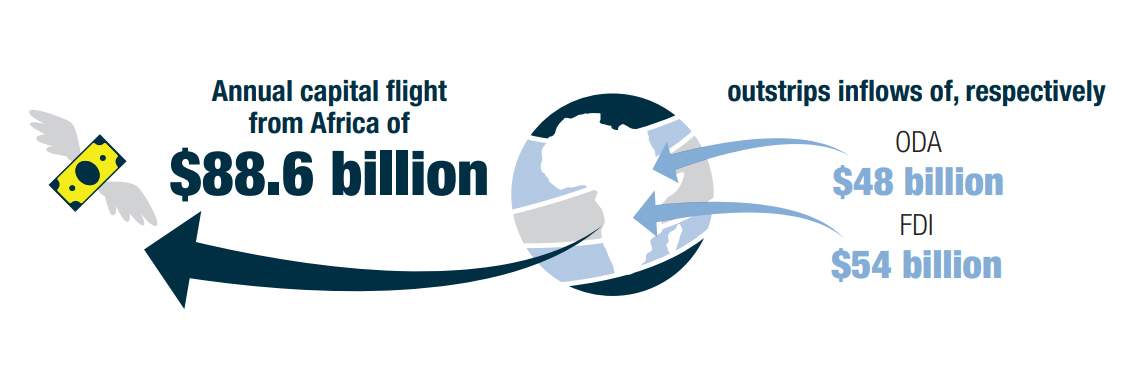The latest UNCTAD report indicates that Africa loses about US$89 billion a year as a result of illicit financial flows and theft which represents 3.7% of its GDP.
At the same time, the total amount of official development assistance received by Africa each year is US$48 billion with the average amount of annual direct foreign investment being US$54 billion. According to the report, Africa loses most of this money because it is not able to tackle illicit financial flows, tax fraud, the falsification of invoices for trade transactions, corruption, and other illegal financial activities.

Mukhisa Kituyi, UNCTAD Secretary-General, said that “Illicit financial flows rob Africa and its people of their prospects, undermining transparency and accountability and eroding trust in African institutions.”
It is estimated that, between 2000 and 2015, Africa lost US$836 billion as a result of fraud and its total external debt in 2018 was US$770 billion.
Illicit financial flows (IFFs) are the main cause of the drain on capital and they significantly weaken the efficiency of the African economy. IFFs also prevent Africa from accomplishing Sustainable Development Goals (SDGs). In countries where the level of IFFs is high, governments spend about 25% less on health and 58% less on education compared to countries who experience a lower level.
The report also finds that women and girls are mostly affected by worse access to health and education. Moreover, financial fraud significantly hinders infrastructure investment. Africa is also challenged by climate change and the additional costs involved in mitigating this and adapting the continent to new conditions. If governments could limit IFFs, sub-Saharan Africa would produce capital of about US$2.4 trillion by 2030, i.e. 50% of the amount it needs to spend on tackling climate change.

At this rate, Africa will not be able to achieve the SDGs because the annual financial deficit caused by IFFs amounts to a total of about US$200 billion.
According to the UNCTAD report, Sierra Leone has one of the highest under-five mortality rates and this number could be decreased by keeping IFFs in check with the money being invested in the healthcare system. It is estimated that, by strengthening its health service, Sierra Leone would be able to save the lives of an additional 2,322 of the 258,000 newborn children annually.
The UNCTAD report also stated that financial fraud in Africa is not inherent in certain countries but is instead connected with specific industries. In the case of Africa, IFFs are mainly generated by mining. In 2015 alone, about US$40 billion was drained by the extractive sector including 77% by the gold industry, 12% by the diamond sector, and 6% by platinum mining.
Africa is also losing money due to tax havens with an estimated US$9.6 billion vanishing in 2014 which is equivalent to 2.5% of total tax revenue. The UNCTAD report assesses that financial fraud in Africa stems mostly from the weakness of local tax systems and the inability of governments to pursue taxes and curb tax avoidance. Thus, in order to resolve this issue, it recommends that in-depth and comprehensive taxation reforms consistent with African Continental Free Trade Area (AfCFTA) protocols are implemented.

